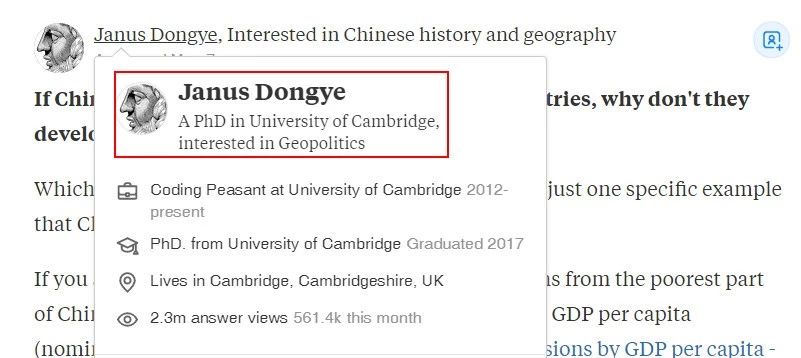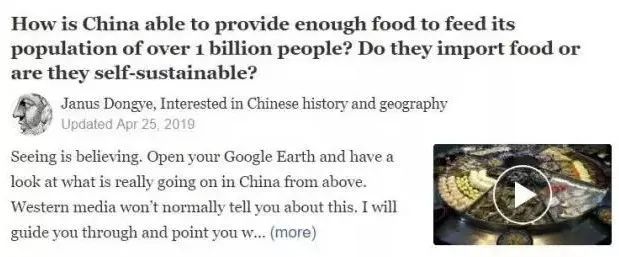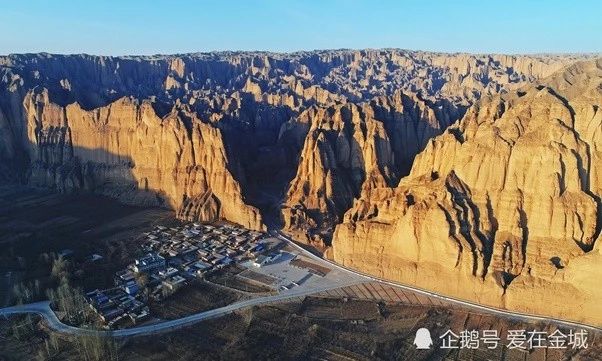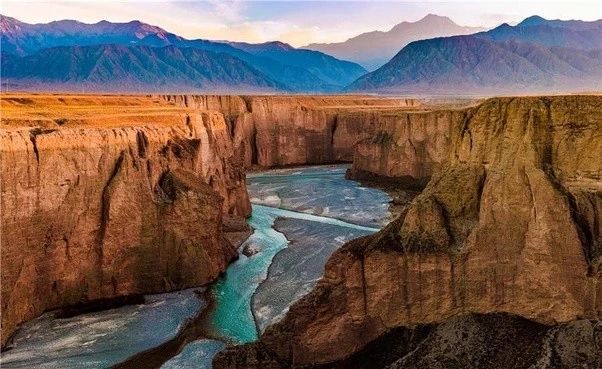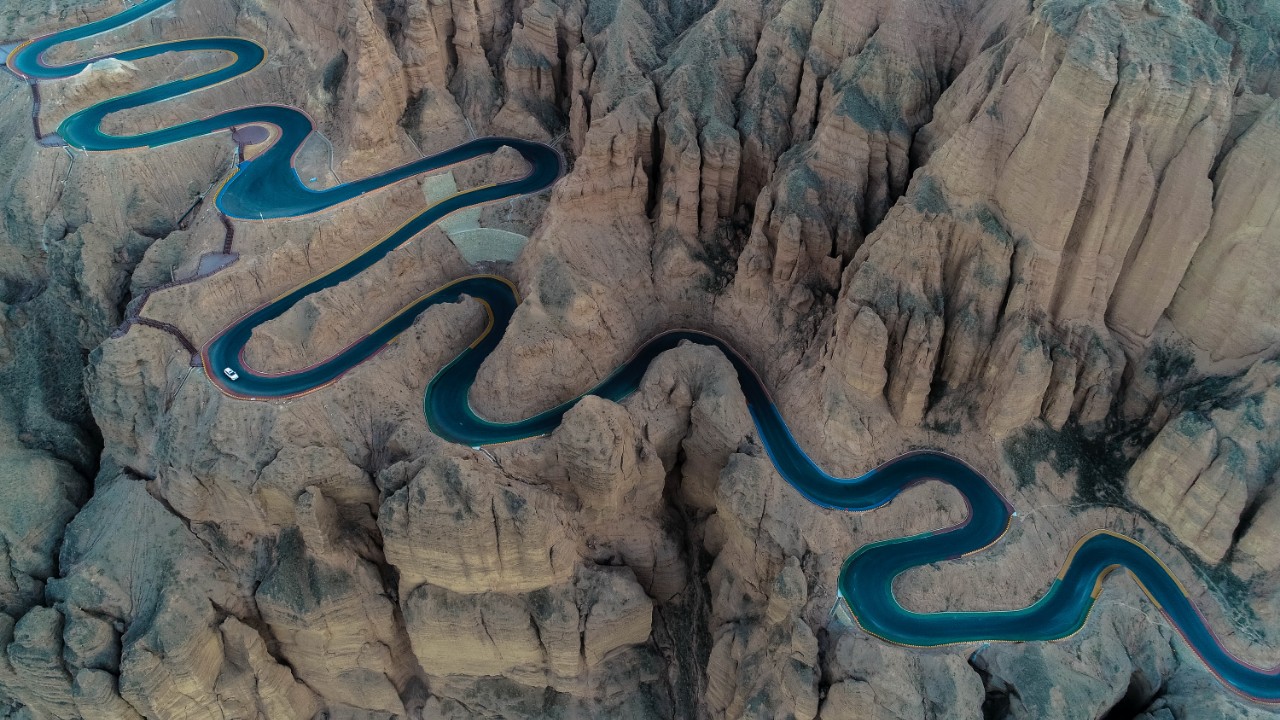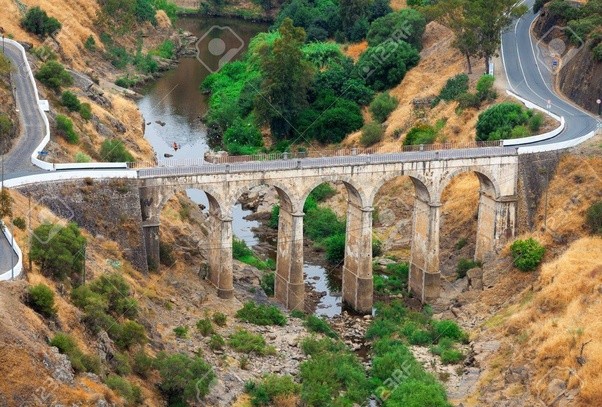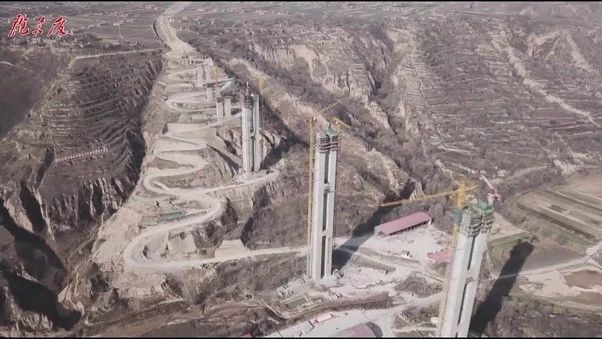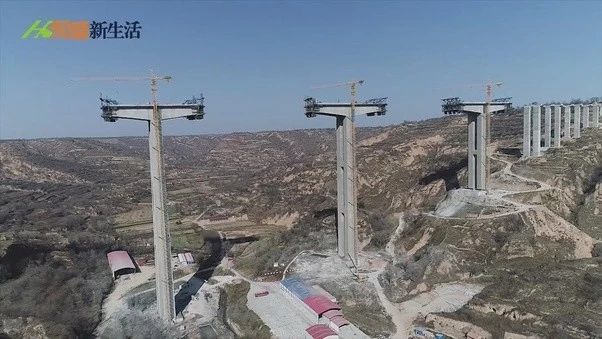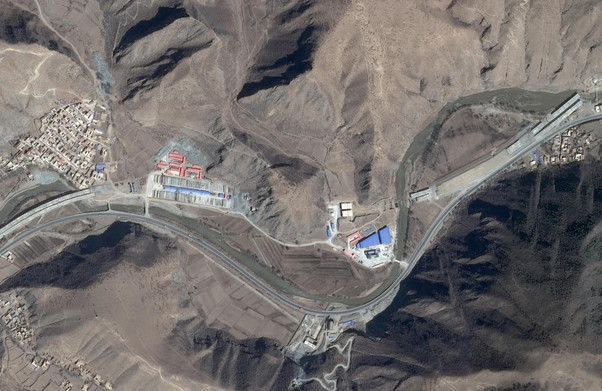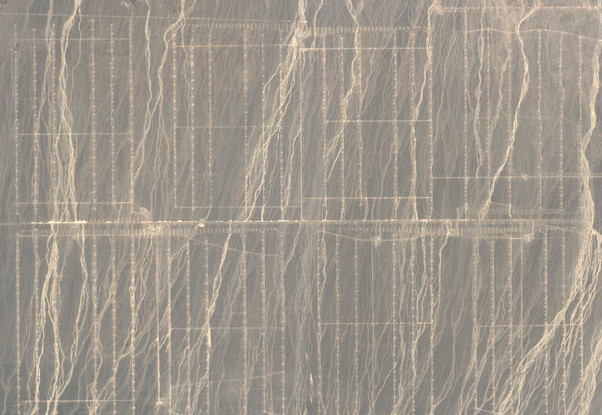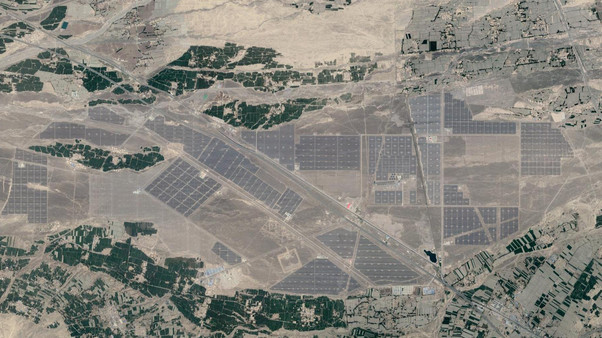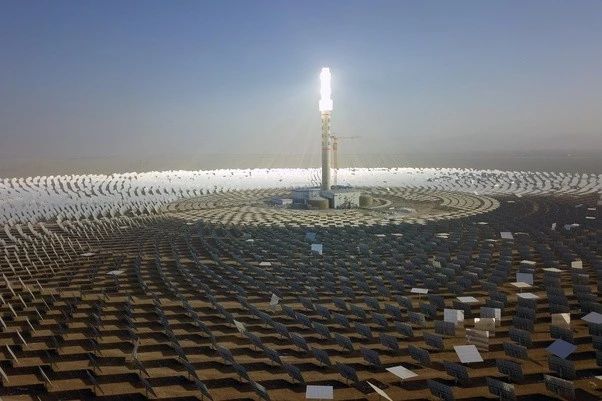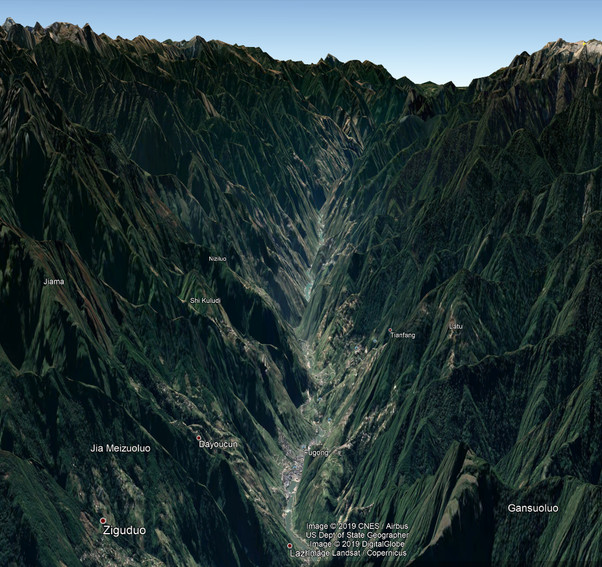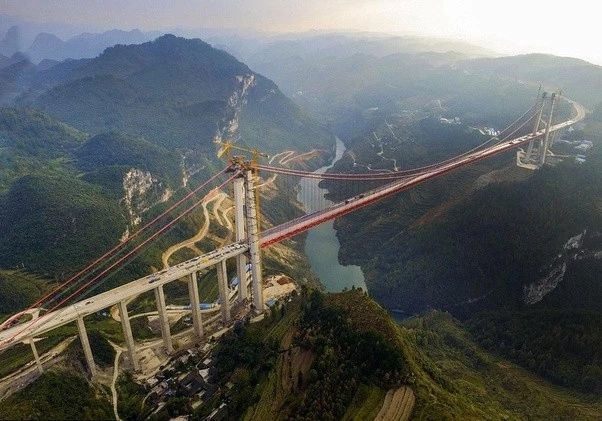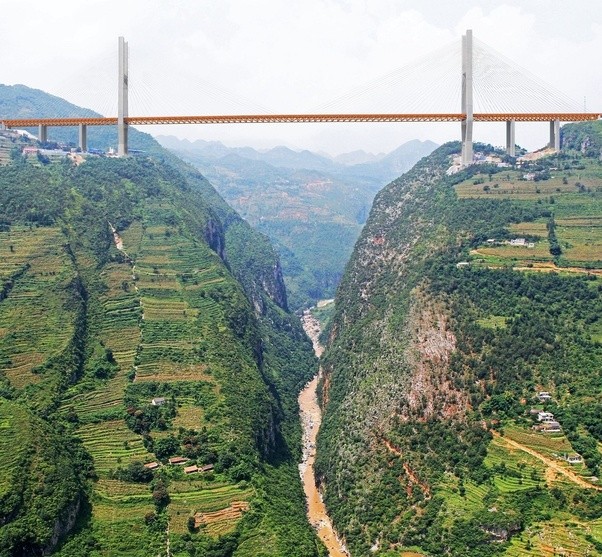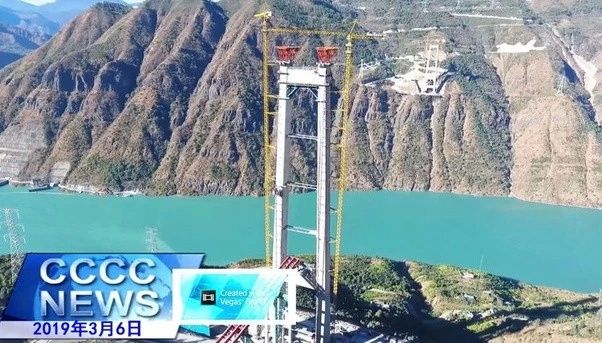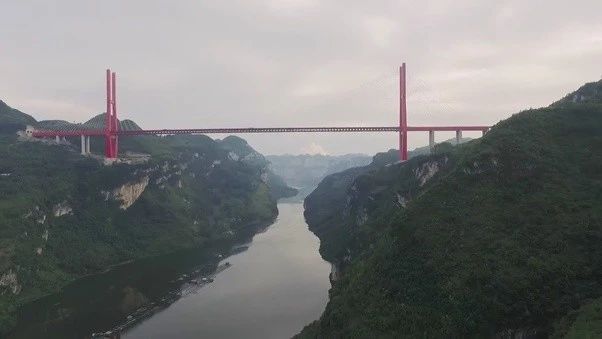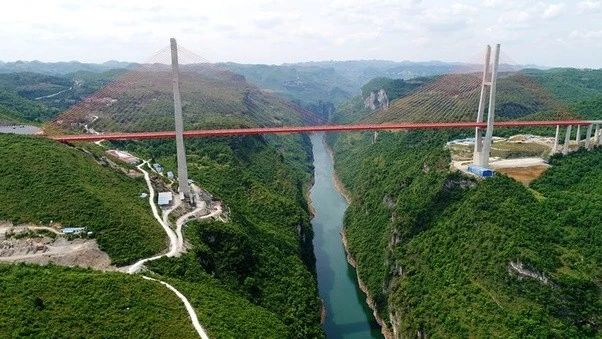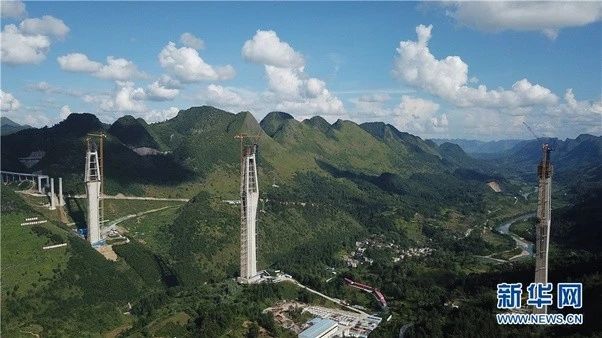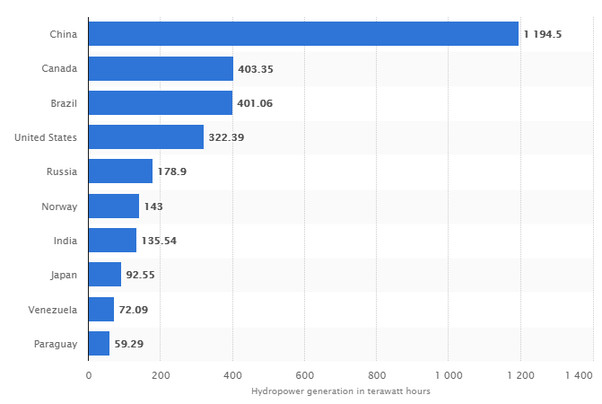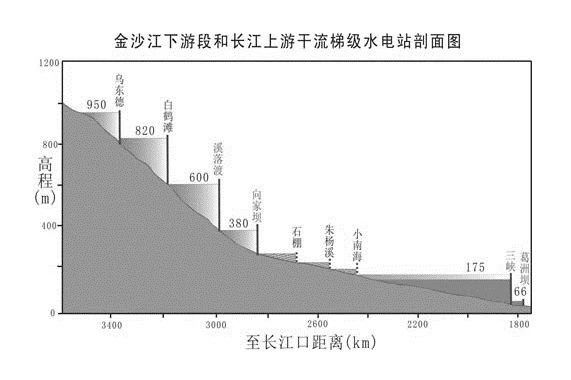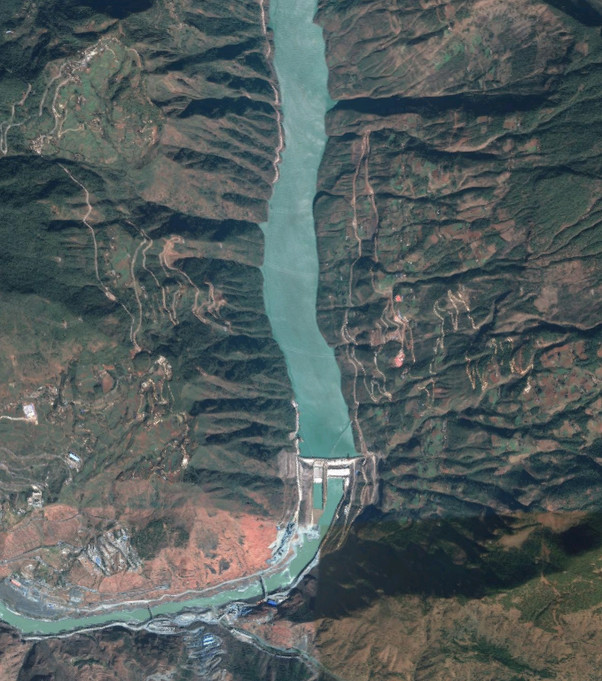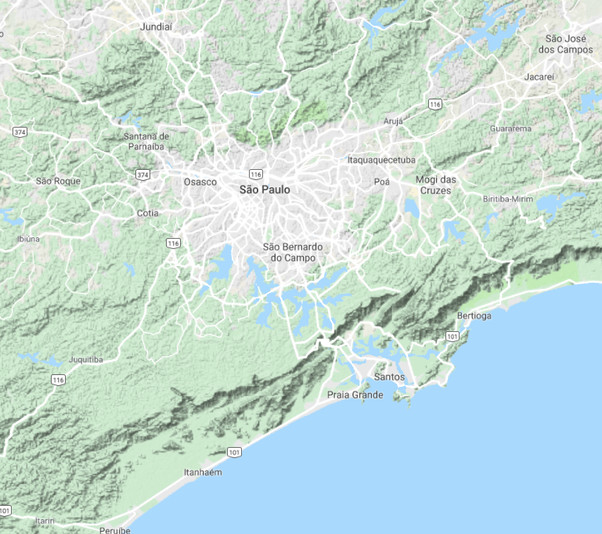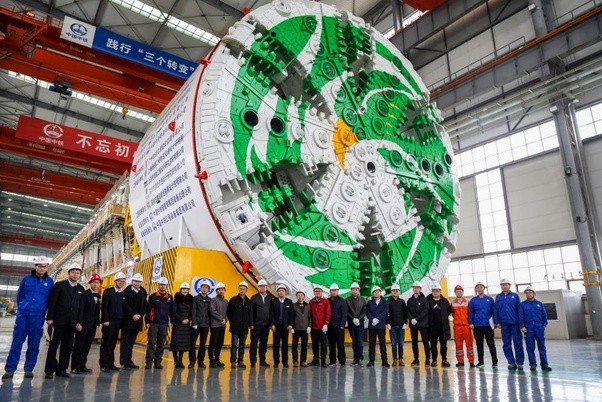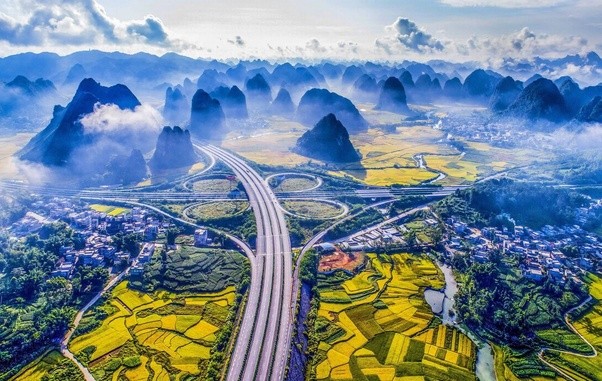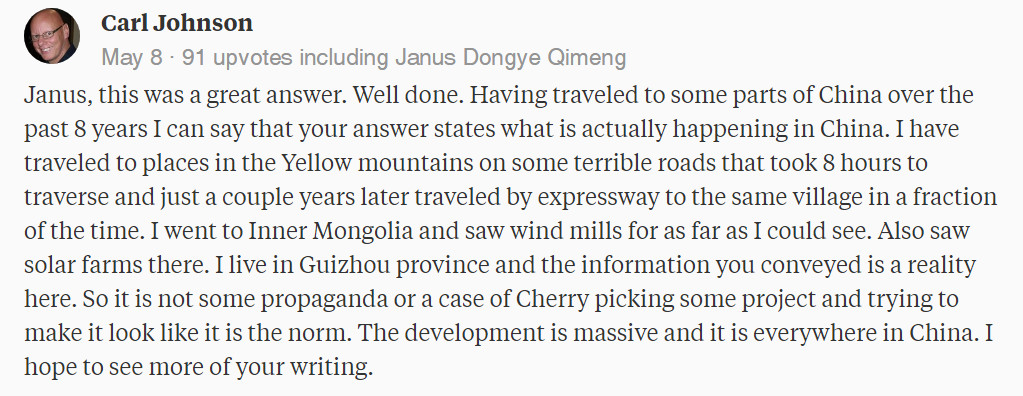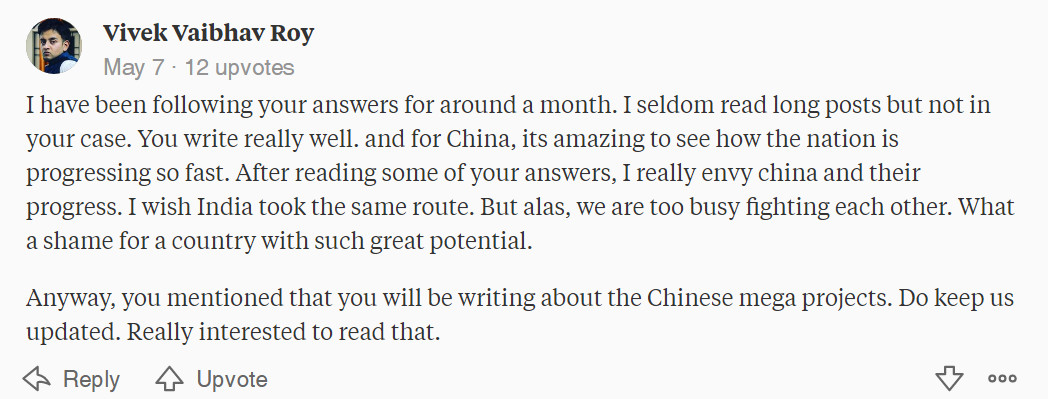剑桥博士:为何中国肯下血本在西方不做的亏本买卖上
近日,在美版知乎Quora上有人再次针对中国提出尖锐问题:如果中国有那么多钱给其他国家投资,为什么不用这些钱来发展中国的贫困地区呢?在这个问题的留言板里,有一个答案内容详实,获赞最高,让围观小伙伴们赞不绝口。
转自:https://finance.sina.cn/china/gncj/2019-05-31/detail-ihvhiqay2662671.d.html
剑桥博士发震撼长文:为何中国肯下血本在西方绝不做的“亏本买卖”上
近日,在美版知乎Quora上有人再次针对中国提出尖锐问题:
如果中国有那么多钱给其他国家投资,为什么不用这些钱来发展中国的贫困地区呢?
在这个问题的留言板里,有一个答案内容详实,获赞最高,让围观小伙伴们赞不绝口。
在晒出答案前,小编想先给大家简单介绍一下回答这个问题的网友,英国剑桥大学的博士Janus Dongye。他对中国的历史和地理很感兴趣,作为Quora资深用户的他,曾经回答过很多和中国有关的提问。
上个月,他回答了“14亿中国人是如何喂饱自己的?”,全网刷屏。
这次,他的震撼长文再次引发轰动。一起来看看他给出的答案吧!
严谨的Janus Dongye首先就提问者过于宽泛模糊的概念——“中国贫困地区”,进行了探讨。
您指的中国哪个贫困地区?您能否举出一个具体的案例,一个中国未开发或者忽视其发展的例子。
Which poor part of China do you refer to? Can you give just one specific example that China has failed to develop or ignored?
如果你不相信,不如让我们从中国最贫困地区的情况看起。
If you are not convinced, let us just look at the situations from the poorest part of China.
Janus Dongye在维基百科上检索到了中国各省、自治区人均(名义)GDP列表,挑出了排名倒数的四个省(自治区),作为讨论范围。
甘肃:4735美元,人口2600万
Gansu province ($4735, 26 million people)
云南:5612美元,人口4800万
Yunnan province ($5612, 48 million people)
贵州:6233美元,人口3600万
Guizhou province ($6233, 36 million people)
广西:6270美元,人口4900万
Guangxi Zhuang autonomous region ($6270, 49 million people)
Janus Dongye还给出了其他国家人均GDP的参照对比数据。
仅供参考:印度(2036美元),越南(2551美元),蒙古(2036美元),阿尔巴尼亚(5289美元),南非(6377美元)。
Just for reference: India ($2036), Vietnam ($2551), Mongolia ($4026), Albania ($) and South Africa ($6377).
范围界定好后,就要开始超长深度分析了!
甘肃
“上帝不希望你住在这里,但你却执意坚持”,从地理层面讲,Janus Dongye认为甘肃更像是一个“不受眷顾”的孩子。
❶
恶劣的地理环境
甘肃穷是有原因的。一面,甘肃大部分地区地处寒冷的青藏高原。另一面,部分地区是荒无人烟的戈壁沙漠。
Gansu is poor for a reason. On one side, you have the massive, cold Tibetan Plateau. On the other side, you have the deadly Gobi Desert.
为了更直观地介绍甘肃的地理环境,Janus Dongye从网上找来了一些关于甘肃地貌的照片。
来看看下面这张图,这是一个典型的甘肃村庄的模样。
Have a look at the following picture. This is what a typical village in Gansu looks like.
红色的岩石、黄色的沙土、幽深的峡谷。甘肃于中国而言就像是你们的美国内华达州。有很多地方就像美国的死亡谷和红色峡谷一样。
Red stones, golden sands and deep valleys. Gansu is the Nevada State of China. There are a lot of sites just like the death valley and red canyon in the US.
△图为甘肃嘉峪关讨赖河峡谷
住在这里是怎样一种体验呢?Janus Dongye描述了这样一幅现实画面。
假想你就住在这里。你在山谷里种植作物,但几乎没有降雨。
Imagine you are living here. You grow your food in the valleys but you have virtually no rainfall at all.
即使你如有天助神奇地成功种了几吨小麦,你能卖到哪里去?
Even if you managed to magically grow a few tons of wheat, where you do sell it?
到最近的城市?那好。请驱车5小时开出这干巴巴的山区。
In the nearest city? That‘s fine. Please drive five hours out of these dry mountains.
好不容易出去了,那又能怎样?来看看运输成本。
即使你设法找到购买你小麦的客户。他将以每吨150美元的价格收购你的小麦。但是,把小麦从这些山区给运输出去,你运输费和燃料成本就已超过每吨100美元。再算下其他成本,好吧……你会赔钱种小麦吗?
Even if you manage to find a customer to buy your wheat. He will buy it for $150 per ton. But your transport and fuel cost to move the wheat out of these mountains has exceeded $100 per ton. Considering other costs, okay… , so do you grow wheat just to lose money?
有图有真相,Janus Dongye放了张图,让大家感受↓↓
△地处甘肃景泰县的一条山路
不受上苍眷顾,不代表会被中国政府忽视。
❷
政府做了什么
Janus Dongye抛出了这个核心问题:为解决这一问题,政府做了什么呢?
投入巨资为当地中国百姓修路!
在“十三五”规划(2016-2020)中,中央政府投入了大量资金建设高速公路、铁路,穿越这万恶的山丘。
For the 13th Five-Year Plan (2016–2020), the central government has poured a huge amount of money in building expressways and railways across these god damn hills.
重点是,修什么样的路,架什么等级的桥。
更重要的是,政府并不是建造单满足于人们通行的“5级”桥梁。相反,他们正在建造的是“50级”闪亮的巨型桥梁。
And what‘s more, they are not building “Level 5” bridges just enough for people to move. Instead, they are building “Level 50” shiny and massive bridges.
“5级”桥梁和“50级”桥梁分别意味着什么?
下图是法国的一座“5级”桥梁,长度和高度都很有限。你必须俯冲,过桥还要爬上山。
Here is an example of a “Level 5” bridge in France. Short in length and height. You have to rush down, cross the bridge and climb up the mountains.
这是甘肃“50级”桥梁的一个例子。您所需要做的就是以120km/h的速度驶过。
Here is an example of a “Level 50” bridge in Gansu. All you need to do is to pass through at the speed of 120km/h.
△甘肃天宁沟特大桥
要建造这些“50级”的桥梁确实非常昂贵。但另一方面,如果考虑卡车、火车和汽车节省的燃料量,它们的成本效益则非常高!因为你不必一而再再而三地上上下下。
These “Level 50” bridges are indeed very expensive to build. But, on the other hand, they are very cost effective if you consider the amount of fuel saved for trucks, trains, and cars! You don‘t have to go down and up again and again.
即使沿着山谷已经有一条“5级”公路,政府仍不满足于此。他们想在这些公路旁边再建“50级”高速公路。
Even if there is already a “Level 5” road along the valleys, the government is still not satisfied. They want to build another high-speed “Level 50” expressway along with it.
△甘肃正在建设中的省级高速公路S2
2019年,甘肃省“50级”高速公路总长度超过4242公里(限速120公里/小时),甚至超过墨西哥。
In 2019, the total “Level 50” expressway length in Gansu has exceeded 4242km (speed limit 120km/h), which is even longer than Mexico.
它几乎是印度“50级”高速公路总长度的三倍。
And it is almost three times longer than India‘s total length.
不仅仅是高速公路,甘肃还有4条时速在250km到350km的高速铁路——宝兰、成兰、兰新、兰渝。
Not only expressways, but Gansu also has four lines of high-speed railways running at 250km/h to 350km/h (宝兰,成兰,兰新,兰渝).
在接下来的“十四五规划”(2021-2025)中,中国政府承诺要让甘肃省每一个地级市都通上高速公路和高速铁路。
In the next 14th Five Year Plan (2021–2025), the government will promise to connect every prefecture city in Gansu with high-speed railways and expressways.
想象一下,你若是之前我们提及的甘肃山区百姓,你的生活水平是不是会随着道路建设的完善得以提高?
为了方便国外小伙伴理解,Janus Dongye对比中美的情况,举了一个更现实易懂的例子。
嗯,这是另一个现实生活中的例子。想象一下,你住在甘肃一个偏远的村庄,想从淘宝(类似于中国版的亚马逊)购买一部手机。2019年从深圳到敦煌,运送一个1公斤的包裹需要多少钱?注意总距离约为3500km。
Well, here is another real-life example. Imagine you live in a distant village in Gansu and you want to buy a mobile phone from Taobao (Chinese Amazon), what does it cost to ship a package of 1kg from Shenzhen to Dunhuang in Gansu in 2019? Note that the total distance is around 3500km.
超过3500公里的运输总成本为15元人民币(2.2美元),并承诺在3天内到达。
The total cost for shipping over the 3500km is 15RMB ($2.2) and it is promised to arrive in three days.
同样的距离、同样重量的物品、同样耗时、同样的情况,美国UPS三日服务的运输成本是26.13美元。
For comparison, the total cost for shipping a 1kg package from Boston to Reno in Nevada (a similar 4000km) in the US is $26.13 according to the UPS shipping price calculator under the UPS‘ three-day service.
因此,在美国,它需要10倍的钱来做同样的事情!但是在计算GDP的时候,这些成本都是算在内的。26.13美元得出来的GDP当然比2.2美元得出来的高。
Therefore in the US, it requires 10x more money to do the same thing! And note that they are both counted in the GDP calculation in both countries. Is it fair? Of course not.
这意味着甘肃并非我们原本想象的那么“贫穷”。
That means Gansu is not as “poor” as we originally thought.
甘肃也拥有丰富的“绿色”自然资源——风力!政府为此做了什么?
❸
因地制宜
一面有寒冷的青藏高原。另一面,则是酷热的戈壁沙漠。温差意味着持续的风力。
On one side, you have the cold the Qinghai-Tibet Plateau. On the other side, you have the hot Gobi desert. Boom! The temperature difference means wind constantly blows.
因此,甘肃是可再生能源领域的领导者。它拥有世界上最大的陆上风力发电厂。
Therefore, Gansu is the leader in its renewable energy sector. It has the world‘s largest on-shore wind farm.
△甘肃酒泉风电基地
甘肃也有很多陆上太阳能发电场。我虽然不确定它是否是世界上最大的。但是你可以从谷歌地图上看到它们,几乎每个地方都有。
There are many on-shore solar farms in Gansu as well. I am not sure if it is the world‘s largest. But you can spot them everywhere on Google Earth.
△甘肃敦煌太阳能光热发电项目
以上就是中国政府对甘肃这个中国最穷的省进行的投资和发展。2018年,甘肃的GDP增速高达10.54%。与其他省份相比,这还远远不够,甘肃依然还有很多偏远村庄没有像样的公路和桥梁。未来中国政府会继续为脱贫做些什么,我们拭目以待。
In summary, these conclude the development in the poorest province of China — Gansu. The GDP growth for Gansu province in 2018 is 10.54 percent. And it is still far from enough compared to other provinces because we still have a lot of distant villages in Gansu that are not yet covered by decent roads and bridges. We will wait and see how China continues to eliminate poverty here.
云南和贵州
云南和贵州穷的原因极其相似,所以Janus Dongye决定将其放在一起讨论。
跟分析甘肃一样,让我们先看看这两个省让人望而生畏的地貌。
❶
大山的子孙
Janus Dongye这样描述道:
板块运动使得印度次大陆持续“挤压”,云贵地区的山越来越高、河流持续将峡谷侵蚀得越来越深,这里的地形变得越来越像“皱纹”。
As the Indian subcontinent continues to squeeze, terrains around here are becoming more and more similar to “wrinkles”, as mountains are squeezed higher and the rivers continue to carve valleys deeper.
设想一下,您就生活在这“皱纹”中间。您被高耸的山脉和深深的峡谷环绕着。
Imagine you are living in the middle of the “wrinkle”. You would be surrounded by tall mountains and deep valleys.
没有飞行器基本无法进出,更别说修路了。你可能要困在这个地方孤独终老。
It is nearly impossible to move around without flying. Building roads is also nearly impossible. You would be isolated for your whole life.
作为一个农民,住这儿你能发财?那才怪了呢。要是生病了,都得打电话叫直升机载你去最近的医院。但你必须有钱才能买得起手机打电话。有了手机,没有信号?
As a farmer, can you get rich if you live here? That‘s nearly impossible. If you are ill, you have to call a helicopter to fly to the nearest hospital. But you have to be rich to afford a mobile phone. No signal?
你绝望吗?估计是会崩溃吧。
Are you desperate? Most likely.
现在来看中国政府的!
❷
世界级桥梁走出大山
Janus Dongye列举了中国政府在这个贫困地区架起的世界级桥梁:
贵州六盘水的北盘江大桥——全世界最高的桥
Beipanjiang bridge, Liupanshui, Guizhou (World‘s highest bridge)
云南宣威市的普利特大桥——全世界第三高的桥
Pu-Li-Te Bridge, Xuanwei, Yunnan (World‘s third highest bridge)
云南丽江的金安大桥——全世界第四高的桥,2020年完工
Jin-An Bridge, Lijiang, Yunnan (World‘s fourth highest bridge, to be completed in 2020)
贵州的鸭池河大桥——全世界第五高的桥
Ya-Chi-He Bridge, Qingzhen, Guizhou (World‘s fifth highest bridge)
贵州的六广河大桥——全世界第六高的桥
Liu-Guang-He Bridge, Liutong, Guizhou (World‘s sixth highest bridge)
贵州的平塘大桥——全世界最大的高架桥,预计今年下半年完工
Ping-tang Bridge, Liutong, Guizhou (World‘s largest viaduct bridge, to be completed later in 2019)
单看这些桥,可能没有太大的触动。对比下另一个国家的情况,你就能感受到中国的实力和速度了。
据Janus Dongye介绍:
这是贵州的一条高速铁路拱桥,高铁能够以250km/h的速度穿过。
A high-speed railway arch bridge in Guizhou. Bullet trains pass through this bridge at the speed of 250km/h.
来比较下,印度现在也在修一条类似的铁路桥——Chenab Railway Bridge。这座桥从2003年开始修,原计划于2009年12月修好,建成之后将成为全世界最高的铁路拱桥。10年过去了,却还没有修完。
For comparison, a similar railway bridge is also being built in India. It is called the Chenab Railway Bridge. However, this bridge started in 2003 and it was originally intended to be completed in December 2009. But ten years have passed and it remains unfinished.
倘若印度再拖延,两年内修不好,那么四川到西藏在建的一条铁路桥就将取而代之,夺得“世界上最高的铁路拱桥”的桂冠。
If the Indian engineers delay another 2 years, the bridge would no longer be the world‘s tallest railway arch bridge. That accolade would go to the Sichuan-Tibet railway bridge.
据Janus Dongye介绍,从目前来说,全世界最高的100座桥几乎都在云南和贵州!回到最先开始我们对地貌的介绍,再想想云贵高速网,不要觉得一切都是理所当然的。
想想看那里的地形,不是高山就是峡谷,你知道建这个高速网络有多难吗?
Think about their terrain and imagine how difficult it is to build expressways here.
除了高速网络,Janus Dongye还介绍了很多云贵地区脱贫的可圈可点之处。
❸
4G网络覆盖
即便在那些连条像样的路都没有的最偏远的村庄,你都总能找到已接入的4G基站。就4G方面而言,世界上没有任何一个国家可以和中国相提并论。
Even in the most distant village with no good roads, you can always find 4G base stations installed. In terms of 4G, no other countries in the world can be compared with China.
根据中国工业和信息化部的数据,中国目前有12.04亿人用上了4G。中国一共有372万个4G基站,比全世界其他国家加起来还要多20%。贵州一万多个村庄实现4G全覆盖,云南的覆盖率达到65%,还在继续推进。
According to the Ministry of Industry and IT in China, there are 1.204 billion users connected to 4G stations in China. There are 3.72 million 4G base stations installed in China, exceeding 20% more than the rest of the world combined. Guizhou has achieved 100% 4G coverage in all its 10k villages and Yunnan is at 65% and counting.
2019年,个人无限流量4G套餐月租为98元钱(14.5美元),家庭套餐月租为134元钱(20美元)。而在美国,T-Mobile公司10GB的流量就要40美元。虽然印度的互联网比中国便宜得多,但与中国相比,其4G覆盖率相对较低。
In 2019, the package price for unlimited 4G internet is 98 RMB ($14.5) for one person and 134 RMB ($20) for a family of three. In the US, 10GB of internet costs as much as $40. In India Internet is cheaper than in China, but 4G coverage is relatively low.
❹
水力发电
没有电力支撑,4G网络将形同虚设。云南和贵州的发展,离不开水力发电。Janus Dongye介绍道:
全世界最大的那些水坝和发电厂大多数都建在云南和贵州。它们为中国贡献了30%的水力发电。
Yunnan and Guizhou are also blessed with hydropower. Most of the world‘s largest dams and power stations are from Yunnan and Guizhou. They contribute to 30% of the hydroelectricity generated in China.
云南的水力发电量:280.4太(拉)瓦时
Yunnan hydropower generation: 280.4 terawatt hours
贵州的水力发电量:65.8太(拉)瓦时
Guizhou hydropower generation: 65.8 terawatt hours
三峡大坝的发电量:88.2太(拉)瓦时
Three Gorges Dam generation: 88.2 terawatt hours
从谷歌地图上沿着云南省的4条主要河流寻找就会发现,同一条河流上都有很多级大坝。光是金沙江就有9级水坝。
Just follow along the four major rivers in Yunnan on Google Earth. You can find many stages of dam on the same river. For example, the Jinsha River (Yangtze) has nine stages of dams.
云南和贵州产生的水电直接传输到广东省和香港,通过已建成的超高压输电线路。
Hydroelectricity generated in Yunnan and Guizhou are directly transmitted to power up Guangdong Province and Hong Kong via an ultra-high voltage power transmission line.
这意味着,您手里一小部分中国制造的产品,生产用电实际上就是云南水力发电。
That means a fraction of made-in-China products are actually manufactured using hydro-power from Yunnan.
❺
数据中心
Janus Dongye特别介绍了为何贵州在大力扶持下能发展为数据中心基地,这与上面政府投入的水电项目密切相关。
这里,小编简单补充下。数据中心的服务器冷却需要大量用水用电。因为网络交换机或工作站必须在一定的温度条件下工作,温度过高就性能下降或者死机。而这些机器本身又会在工作时大量发热,所以需要空调冷却或者水冷,特别耗电。同时,电力稳定也为数据中心的正常稳定运行提供了可行性。
他写道:
正是由于可用于冷却的水电资源丰富,所以,贵州成为了中国最重要的数据中心基地。
Thanks to the abundance of electricity and water resources for cooling, the Chinese government has chosen Guizhou as its most important base for data centres.
Janus Dongye还给出了实例加以证明:
腾讯七星数据中心就扎根于贵州的深山中,这里存储着所有微信和腾讯视频用户的数据。
Deep in the caves of Guizhou, lies the Tencent T-Block data centre. This is the place where the data of all Chinese WeChat and Tencent Video (Chinese Netflix) users is stored.
2018年,苹果公司也把iCloud数据中心建在了贵州。中国所有苹果用户的信息都储存在这里。
In 2018, Apple decided to place its iCloud (China) data centre in Guizhou. This is where all Chinese Apple user information is stored in China.
如今,几乎每一家IT企业都在贵州设立了数据中心,包括阿里巴巴、华为、中国移动等。
Other major IT companies have set up their data centres in Guizhou, including Alibaba, Huawei, and China Mobile.
广西
❶
自然条件先天性不足
Janus Dongye称,广西和越南北部在地理位置和地形方面非常相似。两个地方都有大量的河漫滩平原、丘陵山脉和沿海地区。
Guangxi Zhuang autonomous region and Northern Vietnam are actually very similar in terms of geographic positions and terrains. They both have plenty of flooded plains, hilly mountains and coastal areas.
从理论上来讲,两地的人均GDP应该很相似。但实际上,与广西相比,越南遭受了多次战争,现在广西的人均GDP是6270美元,而越南是2557美元。
In theory, their GDP per capita should be similar but Vietnam suffers many wars compared to Guangxi. Now Guangxi GDP per capita is $6270 and Vietnam is $2557.
其实,广西存在着地理环境上的“先天性”劣势。
“大河向东流”流失了机会和人才。
Janus Dongye认为,广西的主要问题在于区内所有河流都向东流,而不是向南流入海洋。
…the main problem for Guangxi is that all of its tributary rivers flow east instead of heading south to the sea.
即使今天在中国,由于水运成本低廉,仍然有很多重型货物通过河流运输,这对广西来说是一个问题。由于区内所有河流向东流,因此所有来自广西的水运货物都要先经过广州和香港。
Even for today in China, there are still a lot of heavyweight goods are shipped by river in China due to the comparatively low cost of transport. The problem for Guangxi is that, since all its rivers flow directly to the east, all river-based shipment from Guangxi has to go through Guangzhou and Hong Kong.
对于广西首府南宁而言,最大的尴尬之处在于,即便南宁距离南部海岸只有100公里,货轮却需要向东航行1000公里才能抵达海洋。想像一下广西人民为国际航运需要承担的额外成本。
…the biggest embarrassment for the capital Nanning is that ships have to travel 1000km to the east to reach the sea, even though Nanning is only 100km away from the coast to the south. Just imagine the extra cost added for the Guangxi people when it comes to international shipment!
同样的地形问题也出现在巴西,巨大的山脉阻挡了海岸。这就是巴西经济落后,无法发展制造业的原因。
A similar issue can be found in Brazil where a huge mountain range can be seen blocks the coast. …That‘s why the Brazilian economy is not so good and could not develop manufacturing.
△巴西的地形图
广西(比巴西)稍微好一些,但是广西的航运成本比中国其他沿海省份更高。由于高昂的成本,投资和人才都不会来到这里,而且临近广东,广西还因此存在严重的人才流失问题。这是广西贫穷的终极原因。
Guangxi is slightly better but shipping costs in Guangxi are more expensive compared to other coastal provinces in China. Due to the high costs, investments and talents would not come and it suffers the severe brain drain from the nearby Canton. This is the ultimate reason why Guangxi is poor.
因此,广西需要的是尽力改善基础设施,吸引来自重庆和昆明的货物运输。
They need to try their best to improve infrastructure and attract shipments from Chongqing and Kunming.
政府需要调整发展方向,因地制宜,弥补广西先天性不足的自然条件。
❷
政府做了什么
Janus Dongye认为,广西自治区政府意识到了广西自然条件的缺陷和发展中存在的不足,及时调整发展策略。
幸运的是,广西自治区政府已经意识到了这个问题,在集中精力发展与云南和贵州的联系,而且他们提议修建运河。
Luckily the current CPC leader in Guangxi has realized the problem and is now focusing on promoting connections between Yunnan and Guizhou. And they have also proposed to build Canals!
广西的“十三五”规划中提到,要评估修建连接平塘河与南部钦江的平陆运河的可能性。
For the 13th Five-Year Plan in Guangxi, the CPC is planning to “evaluate” the possibility of the Ping-Lu Canal (平陆运河) that connects the Pingtang river to the Qinjiang river in the south.
这条运河长20公里,建造成本非常高。它的长度是泰国克拉地峡运河的一半。
The canal is 20km long and it is very expensive to build. For reference, it is half the length of the Kra Canal in Thailand.
如果建成,这条运河将显著地推动广西经济的发展。通过连接水路,货船可以在广西大部分河网上运输超重型机器和货物,这将最终解决广西的问题!
If it were built, it would be a truly significant boost for the Guangxi economy. With connected water, ships can then carry extra-heavy machinery and goods across most of the river network in Guangxi. It would finally solve the Guangxi problem!
对于公路和铁路网的密度和可达性方面,广西还有很大的提升空间。我不再具体列出,因为这个方面与云南和贵州相似。
Regarding its road and railway network, Guangxi still has a lot of rooms to improve in terms of density and accessibility. I will not list their detailed projects because they are similar to Yunnan and Guizhou.
西方国家做不到的“亏本买卖”
这都是“中国特色社会主义”在发挥优势!
Janus Dongye最后总结道,他希望通过这篇长文,大家能对中国四个最贫困省份的发展状况有所了解。需要注意的是,中国在国内进行的投资远超过国外投资。这些信息都出现在媒体报道中,只是人们没有注意到。
此外,上述大多数项目都是由中国国企主导修建的,这样做实际上是“亏本的买卖”,但却给老百姓带来巨大的社会效益。这是“中国特色社会主义”在发挥作用。这也是为什么美欧等西方国家做不到也不考虑去做的原因。
And it is also worth noting that most of the above projects are led by Chinese state enterprises. They lose money for doing this. But they bring huge social benefits to the general people. This is called “socialism with Chinese characteristics” and it is working. That‘s why the West such as the US and Europe could not achieve nor even consider doing it.
△广西高速公路的图片
Janus Dongye这篇深度贴文在Quora中被高度讨论关注,还引发了很多网友的共鸣。
Janus,这真是一个很棒的答案。在过去的8年里,我去过中国的一些地方,你的回答正说明了中国正在发生什么。我去过黄山的一些地方,在一些可怕的公路上走了8个小时,而仅仅几年之后,就能在很短的时间内,通过高速公路到达同一个村庄。我去过内蒙古,看到了目光所及最远处的风车。我也看到了那里的太阳能农场。我住在贵州省,你传递的信息正是那里的现实。所以这不是什么宣传,也不是精心挑选一些项目,试图让它看起来像是日常。中国的发展是巨大的,并且遍及各处。希望能看到你更多的作品。
有趣的回答!请继续。非常感谢你花费时间写下如此全面而美丽的答案,谢谢你和我们所有人分享你的知识。
我已经关注你的答案大约一个月了。除了你的文章以外,我很少读长文章。你写得非常好。至于中国,看到这个国家发展得如此迅速,我十分惊讶。在读了你的一些回答之后,我十分羡慕中国和中国的进步。我希望印度也能走这条路。但很可惜,我们忙于内讧。对于一个拥有如此巨大潜力的国家来说,这是多么遗憾。
总之,你提到过你会写一些中国的大型项目。请继续更新吧,我真的很有兴趣读下去。
大多数人完全不知道中国正在发生什么。谢谢你的这篇好文章。
责任编辑:梁斌 SF055
本文为转载文章,版权归原作者所有,不代表本站立场和观点。
下一篇:三类在未来会有较好发展的产业
 2019-09-14
2019-09-14
 7
7 0
0
